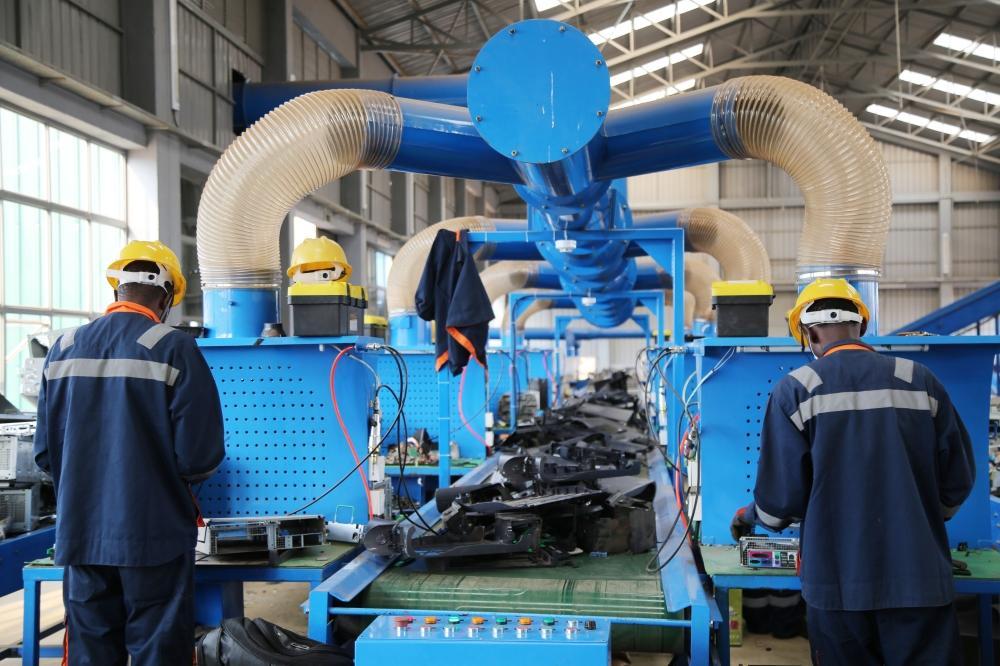Africa-Press – Rwanda. The government is set to operationalise an Extended Producer Responsibility (EPR) system, which will require manufacturers and importers of electrical and electronic equipment to pay a fee supporting the collection and recycling of e-waste.
Extended Producer Responsibility is a policy approach that makes producers accountable for the entire lifecycle of their products, including waste management after consumer use. It aims to promote sustainable product design, enhance recycling efforts, and reduce environmental harm.
The country’s commitment to EPR is outlined in the 2016 National E-Waste Management Policy and the 2018 Regulation No. 002 governing e-waste management, which mandate that producers of electronic and electrical equipment (EEE) take responsibility for the end-of-life management of their products.
To implement this system, Rwanda is setting up a Producer Responsibility Organisation (PRO), which will coordinate e-waste management efforts among producers, recyclers, and the government.
According to Enviroserve Rwanda, an e-waste recycling facility in Bugesera District, the country generates between 9,000 and 15,000 tonnes of e-waste annually, but around 80 percent remains uncollected and untreated.
Since 2022, stakeholders have been working on a national EPR system to ensure that manufacturers and importers take ownership of the lifecycle of their products. The system will include a centralised digital platform for registering producers, tracking products from import to disposal, collecting fees to fund recycling, and generating regular reports on collection and recycling performance.
Jacqueline Mukamisha, Smart Cities and Community Outreach Specialist at the Ministry of ICT and Innovation, said the EPR system is expected to be a key step in addressing Rwanda’s e-waste challenge.
A new e-waste management strategy for 2025–2030 is being developed under the World Bank-funded Rwanda Digital Acceleration Programme. It will define how importers contribute to the end-of-life handling of electronic equipment, including a fee structure based on material type, lifespan, and weight.
“While importing, they will be charged a small fee calculated according to the type of material, lifespan, and weight of the imported products,” Mukamisha said.
“That amount would be used during the recycling of those materials once they are obsolete.”
She added that the strategy will provide guidance for importers, wholesalers, and retailers of EEE on proper e-waste collection and disposal, while also defining their obligations under the EPR framework.
So far, 34 e-waste collection points have been established across the country, with 10 more expected by the end of June. The target is to have at least two per district.
Robert Mugisha, Director of Registration and Licensing at the Rwanda Inspectorate, Competition and Consumer Protection Authority (RICA), noted that while over 250 traders deal in used electronics, the market lacks comprehensive data on incoming devices—highlighting the need for regulatory oversight via EPR.
Experts warn of health, environmental risks from e-waste
Experts caution that improperly handled e-waste poses significant environmental and public health risks.
Abias Maniragaba, an environmental economics lecturer at the University of Lay Adventists of Kigali (INILAK), said electronic devices often contain toxic materials that, when dumped or decomposed in soil, can lead to cancer, infertility, and poor agricultural yields.
“Many of these devices contain radioactive metals that evaporate easily and can contaminate soil and air,” he said.
“Lead in batteries, for instance, can dissolve into the soil, affect crops, and pose fatal risks if consumed.”
Maniragaba said chemicals found in e-waste can interfere with the endocrine system and damage body cells, potentially leading to infertility and cancer. Mercury, often found in old computers, can damage the brain, while radioactive metals like uranium and cobalt continue emitting harmful rays even after the devices are discarded.
He also warned that technological growth in Rwanda increases the risk of e-waste buildup unless proper measures are enforced.
“There are schools with piles of old computers—the ones that used floppy disks—stored in unsafe conditions,” he said.
“This poses risks to students and staff and underscores the importance of a robust e-waste management strategy.”
Proper e-waste handling, he added, will also contribute to climate change mitigation by cutting down carbon emissions.
For More News And Analysis About Rwanda Follow Africa-Press






